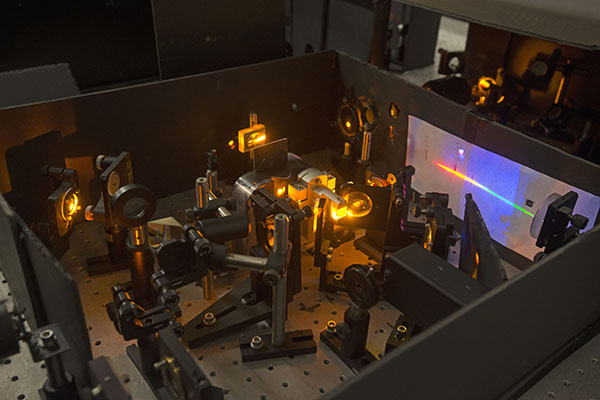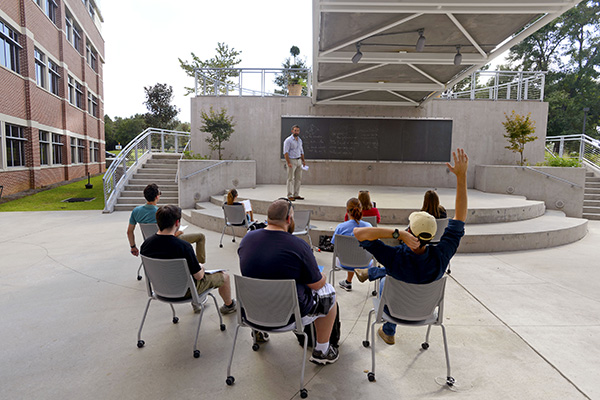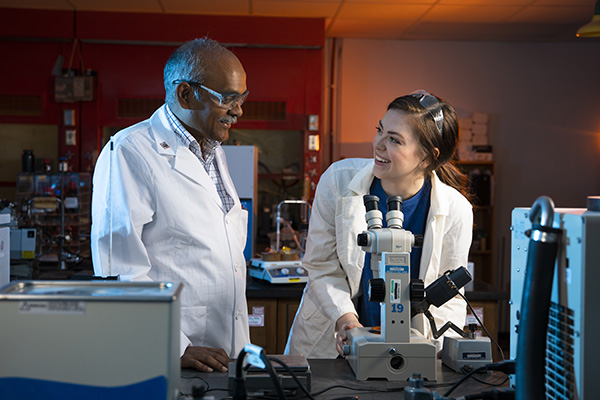A physics degree from UWF trains you to become an expert problem solver. You will learn to apply advanced mathematics, computing, data analysis and experimental techniques to arrive at a solution.
Open the door to discovery—and a wealth of career options.
Why Study Physics at UWF?
Our physics students excel at problem-solving, mathematical reasoning, programming, organizing and interpreting data, observation, communication and laboratory skills. All of these qualities are in great demand by employers.
You will learn in well-equipped facilities, taught by experienced and approachable professors dedicated to giving you one-on-one attention and hands-on experience.
You will have many opportunities to engage in a variety of research activities and to work side by side with faculty members.
What You Will Learn
The goal of physics is to understand how nature behaves, from the smallest subatomic particle to the entire universe, making it the most fundamental natural science. You will study electricity and magnetism, electronics, mechanics, optics, quantum phenomena, concepts of relativity, thermodynamics, waves, computational methods and related laboratory activities.
Our Bachelor of Science in Physics program has two specializations: Physics and Engineering Physics. Both specializations prepare you to enter graduate programs in physics or to find employment in a broad range of settings, including academia, industry or research science.
Our Bachelor of Arts in Physics program has two specializations: Physics and Physics Teaching. The Physics pecializations prepares students for a career in many different fields, such as secondary education, software engineering, quality control, and business. Students enrolled in the Physics Teaching specialization will gain the knowledge and skills needed teach students in grades 6-12 while earning a physics degree.
A minor in physics will increase your knowledge of physics past the preparatory level, developing your understanding of key principles and strengthening your analytical abilities.
The physics specialization focuses on the study of matter and its motion. It provides you with a firm foundation in mechanics, electricity and magnetism, electronics, thermodynamics, statistical physics, quantum theory, mathematical physics, computational physics, and lab techniques.
The engineering physics specialization emphasizes the application of basic scientific principles to the design of equipment, including electronic and electromechanical systems for use in measurements, communications and data acquisition.
The B.A. in physics program imparts an understanding of fundamental branches of physics, such as classical mechanics, electrodynamics, thermodynamics, optics, and quantum mechanics, and relativity. In addition, the student will be able to minor in any one of several fields. The primary purpose of this program is to prepare students for a career in many different fields, such as secondary education, software engineering, quality control, and business. Graduates of the physics B.A. program are strongly suited for a career in medicine, finance, education, or law, with physics majors having the highest aggregate scores on the MCAT and LSAT exams. The degree program may include a minor in any of the fields of interest, such as pre-professional biology, chemistry, mathematics, physics/science education.
Our innovative program will provide you with a degree in physics plus a Florida professional teacher certification. You will gain the knowledge and skills you need to teach students in grades 6-12 with diverse learning needs.



.jpg)



